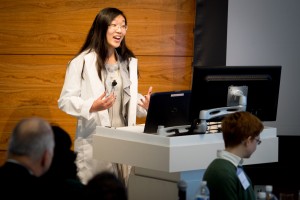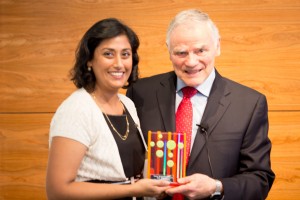Valerie Logan Luncheon Raises $50K for Science Education Programs at ISB
 isbscience.org/news/2013/11/22/valerie-logan-luncheon-raises-50k/
isbscience.org/news/2013/11/22/valerie-logan-luncheon-raises-50k/
The Second Annual Valerie Logan Luncheon, which took place on Nov. 13, raised just over $50,000 (UPDATE: As of Dec. 18, 2013, the total funds raised has reached more than $60,000) for our education programs at Institute for Systems Biology.

Julia Joo, who spent her summer as an intern at ISB, gave a testimonial during the Second Annual Valerie Logan Luncheon held at Institute for Systems Biology on Nov. 13, 2013. (Photo by Scott Eklund/Red Box Pictures)
Guest speaker Julia Joo, who spent her summer as a high school intern here at ISB, shared with us the educational journey that led her to choose science as a career path. “Where my science classes and exposure to local scientists planted the seed of a deep interest in scientific discovery, ISB is truly where the flower of my passion for research bloomed to fruition,” Joo said.
ISB’s president, Dr. Lee Hood, presented the Valerie Logan Leadership in Science Education Award to Dr. Meena Selvakumar, the acting vice president of Strategic Programs at the Pacific Science Center. Among her many achievements, she developed and directs the Portal to the Public Initiative, which focuses on creating opportunities to expose a general audience of all ages to current scientific research and also to train scientists in how to better communicate their work to a lay audience.

Dr. Meena Selvakumar received the Valerie Logan Leadership in Science Education Award from Dr. Lee Hood during the Second Annual Valerie Logan Luncheon, which took place on Nov. 13, 2013, at the Institute for Systems Biology in Seattle. (Photo by Scott Eklund/Red Box Pictures.)
“This has been a true highlight for me,” Dr. Selvakumar said.
Dr. Hood also announced that ISB is creating a strategic plan that enumerates new possibilities for how systems biology can continue to catalyze fundamental changes not only at levels K-12 but also at the undergrad and even graduate levels. “In keeping with all our past successes and this emerging vision – and to honor Valerie Logan – we’re going to rename our program as the Logan Center for Education,” Dr. Hood said.
The education team will share more detailed information about the Logan Center and the education strategic plan in early 2014.
Thank you to all of ISB’s supporters and partners (including corporate sponsors Boeing, Touchstone, Iverson Genetics, Tulalip Tribes, KeyBank and Salal Credit Union) who make it possible for us to continue Valerie’s vision to inspire an ever-growing number of students like Julia to seize opportunities and excel, and to honor leaders in science education.






